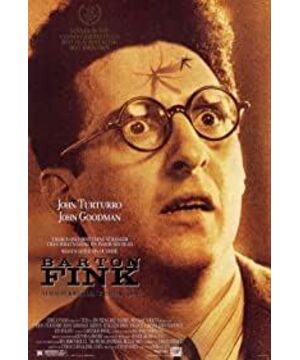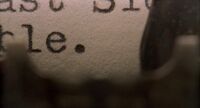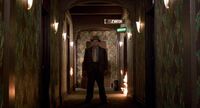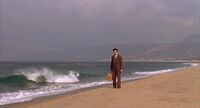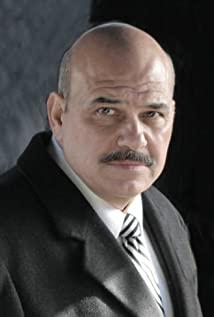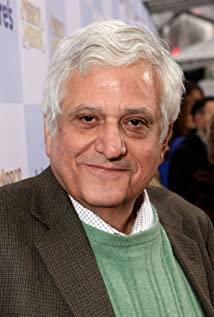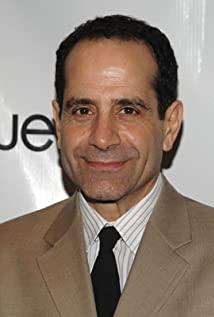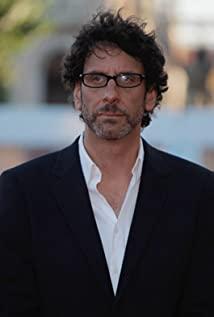After reading it twice, I think I almost understand it. Let me explain my understanding.
1. Performance method
It can be basically confirmed that the prototype of the alcoholic writer Mayer in the movie is William Faulkner, the master of stream of consciousness, and this film also expresses its theme through the method of stream of consciousness. Anyone who has read Faulkner's book knows that his language is fragmented, that is, a paragraph of text, or even a sentence, contains the content of different times, places, and characters. Of course, films cannot be fragmented. To express, otherwise such a movie would be completely unwatchable. As a stream of consciousness, it is more concerned with the process of human inner changes. Similarly, the Coen brothers tried to track the creative process of a writer-Barton Fink was in a semi-psychedelic state due to the extreme pain of creation, Inner needs -> mood swings -> hallucination changes, as video art, film can only show the part that can be accepted by audio-visual, that is, the part of the final hallucination change. To understand this film, it is necessary to trace the true inner changes of the characters through these illusions.
The real story
Let's first take a look at what happened in the real world, or simply put, what kind of "story" the film tells if the fantasy content is put aside.
Quite simply, a playwright, Barton Fink (who is particularly good at portraying the lives of underclassmen), has had some success on Broadway in New York. Under the arrangement of the reporter, he came to Hollywood in Los Angeles and joined the Guodu Film Company to seek development. The studio boss had high hopes for him, asking him to come up with a wrestling script within a week. He lived in an old, deserted hotel and started his creation. But he soon discovered that he knew nothing about the Hollywood way of making things. If a script is not based on life, but depends on the preferences of the audience, the needs of the market, and an empty dream "created" out of thin air, then he can't even find the starting point of this dream. Under the impatience, he found the producer Geisler, inspired by the other party, he met the famous writer Mayer again, hoping to get his guidance. But at this time, Mayer was already exhausted, relying on alcohol to anesthetize himself all day. Unable to get any help and unable to do anything, Patton was under enormous mental pressure: the boss's expectations, the threats from the people around the boss, his personal reputation and future. After going through a lot of painful struggles, he still decided to write a script that he was satisfied with according to the way he was good at - focusing on the lives of the lower-level characters. However, the boss scoffs at such a script - it clearly has no commercial value. As a result, the script was rejected, the writer was frozen, and the original producer Geisler was fired.
3. Mental journey and hallucination scenes
The first hallucination appeared after the boss explained the task, he returned to the hotel and started to create, and then found that he had no ideas at all. Under extreme depression and dissatisfaction, an important fantasy character Charlie appeared. It needs to be explained: Charlie represents the writer's "id". He is not a devil in the overall situation, but the "true self" recognized by the writer's subconscious, is his ideological liberator, and a completely positive "character" ". At this stage, his inner need is to vent, to hope that his ideas will be recognized, and to be strongly dissatisfied with the actual needs. So the point of this paragraph is what he talks to Charlie and gets the other person to understand.
The second hallucination appeared after meeting Mayer and discussing the script with his personal secretary Audrey at an appointment. The fantasy character was still Charlie. Writers at this time were still mostly reverent for Mayer and full of hope for the upcoming discussion. At the same time, it was learned in the conversation with Audrey that she and Mayer were still lovers - this again touched his "sex" consciousness deep in his heart. The hallucination this time was the most relaxing one. I made some hypothetical understandings about the object I was about to describe—wrestling, talked about my family, and admitted my loneliness.
After the talks with Mayer and Audrey, and before the final meeting with the boss in military uniform, except for a few realistic scenes interspersed, it was all fantasy.
Fantasy 1: Charlie is about to leave. In the meeting with Mayer, Mayer talked about his view of creation, and the most important sentence was: I just like to make up stories, yes, sir, escape. Although Patton vehemently objected and denounced him as the "son of a bitch", he had to admit painfully that, here, in Hollywood, this was the only correct way to survive. In order to write a script that fits the boss's intentions, he has to give up his previous life, his previous creative attitude, his previous artistic perspective, so, as a symbol of it all, Charlie can only say goodbye to him sadly.
Fantasy 2: Meeting with Geisler. After giving up everything, Patton began to "make up stories", but his lack of imagination and poor experience made him completely incapable of such work. He had to make this assumption: what would happen if the producers knew he was completely unable to work? Of course Geisler would be furious -- it weighed heavily on him, and at the same time had the illusion that, as a common good, Geisler should give him some help.
Fantasy 3: Watch the demo. In fact, it is just a cyclical process in which he is constantly constructing ideas and constantly denying them. The characters in the black and white film are hilarious and ugly, repeating the wrestling process over and over again. Cut to the writer's face, with a very ugly expression, "looking" at the wrestling scene he conceived, he may even feel disgusted.
Fantasy 4: Ask Audrey for help. The actual scene is of the writer pacing the room, with the words "Orphan? Dame?" on the printer, indicating that he is working on ideas according to his boss's needs, but is clearly in a corner. In this case, he was forced to make the last choice—the most shameless choice for a literati—plagiarism. Because Mayer had written the script about wrestling, he called Audrey in to try to understand the details. But his inner conscience resented his own behavior, so Mayer became a shameless plagiarism, so he scolded him bitterly—in fact, he scolded himself. The two end up in bed, implying that he stole his most important things from Meyer's hands.
Fantasy 5: Death of Audrey. Mosquitoes are killed, suggesting a relief from the current predicament - ripping off Mayer's frame of his story and adding some polish to it. But doing so will lead to even more dire consequences - how to cover up your plagiarism? So a drop of mosquito blood will lead to bigger and bloodier consequences - Audrey will be killed, and even Mayer will be killed. Charlie, as the last psychological dependency, took care of the aftermath for him. In fact, it is just a psychological escape, a shirk of responsibility.
Fantasy 6: A meeting with the boss Jack. The writer has completely collapsed at this time, and can only hope for a miracle to happen. So the fantasy this time is very childish and ridiculous - the boss will be merciful, take his place completely, and remove the dangerous factor - the people around him, worship his talent and give him the strongest support- —Such a thing of course never happens.
Fantasy 7: Charlie actually leaves. Before leaving, Charlie gave him a box and asked the writer to keep it until he returned. What's in the box? Charlie has made it very clear - when you think it's important and want to keep it for life, but it can fit in a little box like this. In the box is his life accumulation, his initial belief, and his most precious spiritual wealth. Charlie told him it would help him with the script. Now the writer is caught in a dilemma between personal claims and business needs, breaking down and crying.
Illusion 8: Prompt from the Bible. Two books of the Bible are quoted here: Daniel and Genesis. The part of Daniel Nebuchadnezzar's request to interpret the dream represents the power of the boss, and the part of Genesis is replaced by his own words, representing the creation of the individual. Is a writer, in creating a work, a slave or a god? Button will choose between the two, gradually leaning towards the latter.
Fantasy 8: Meeting with two police detectives. The police detective is the embodiment of external pressure and the executor of the business order. When Patton began to think about creating in his own way, he was bound to face such pressures psychologically. First of all, they will completely deny their own ideas by telling him the "truth": Charlie is a lunatic, a murderous madman who can do all kinds of evil. Their arrogant attitude aroused the writer's anger and self-esteem.
Real scene: Button shakes the box, and it can be seen that the box is very light. Then stared at the box, made the final decision, and started my own creation. The box is real, and when Patton first came to the hotel, CHET asked him if he had any other salutes? Patton responded that others were being sent. This box should have been sent later, and it should contain the manuscript he wrote before.
Fantasy 9: Disputes with Sailors. Patton's creation was finally complete, and he couldn't hide his excitement, and he briefed reporters in New York. At this time, his mood was both excited and apprehensive - he felt that he had created a masterpiece, but he doubted whether his work could be accepted by ordinary audiences. The sailors symbolized the low-literate general audience who just needed something as simple as "make them cry, make them laugh," so Patton was under siege. In the end he lay on the ground, looking at this crazy and ridiculous world.
Fantasy 10: Investigate rescues Patton. This is Final Fantasy, a complete awakening of personal consciousness. Now that it has been determined in Fantasy 9 that his work will not be recognized by the market, how will Barton persevere? Now he will confront the detective head-on, and in the face of the police detective's repression, Patton said calmly: He's back, it's hot, Charlie is back. Charlie came out of the fire like a god, and shot the two detectives to death. After the two had a long conversation, Barton recognized himself, and Charlie twisted the steel bars on the bed with extraordinary strength, freeing him, and the fantasy ended.
The beauty that appeared on the beach at the end was of course not real, but it was not Barton's hallucination, but a question and mockery sent by the Coen brothers to the world.
4. Some details and metaphors
1. The beautiful beach painting hanging on the wall represents the muse, the goddess of literature and art. When Patton runs out of ideas, he prays to the goddess to give him inspiration, which is the meaning of a few close-ups.
2. One day or a lifetime is written on the hotel note paper, which is asking you whether you are pursuing short-term interests or life-long careers.
3. The peeling of the wallpaper suggests that Barton's heart is gradually breaking down, so Charlie will give him pushpins to stabilize his heart.
4. When Patton went to visit Mayer, he could be heard shouting "Honey? Where is my honey?" in the room when he was drunk. This Honey was referring to his wife Estelle in his hometown. Esther is a symbol of Mayer's talent before she came to Hollywood, but she is now ill, hinting at the drying up of Mayer's talent.
5. The book Meyer signed for Patton is called "Nebucadnesar", which should be an "epic masterpiece" that sings praises to a generation of king Nebuchadnezzar, indicating that he has been completely conquered by power.
6. Meyer said to Patton, "Your creation? Boy, do you know Solomon's mother?" According to the Bible, Solomon's mother was named Bathsheba, who was the wife of Uriah, a general under King David, David. The king seized her and killed Uriah, but gave birth to Solomon, the greatest king of the Jewish nation. Mayer used this allusion to illustrate that only by relying on hegemony and cooperating with giants can he write great works. Personal creations will only produce small pieces.
7. After killing two detectives, Charlie said: Hi! Hitler! Here Charlie is laughing at the two police detectives, thinking that the suppression of artists by powerful capital is no different from Hitler, and the police detectives are no different from Nazis.
8. Charlie said to Patton: I live here, this is my home, and you came in with a printer, just a passerby, but you think I disturbed you. This sentence corresponds to One day or a lifetime on the note paper, and the meaning is shown in Article 2 above.
9. Finally, the beach beauty asked Barton two questions: What's in the box? Is that yours? ——The Coen brothers questioned the artists: What's in your mind? Is that yours? Patton asked back, you are very beautiful, will you appear in the movie? The goddess replied: Don't be stupid. - There is no real art in commercial films.
10. It is said that the bird that fell from the sky to fish in the sea was an accident, but the Coen brothers kept the piece. - Maybe you want to pursue freedom, but the reality will make you fall from the sky to make a living, very bitter metaphor.
View more about Barton Fink reviews


